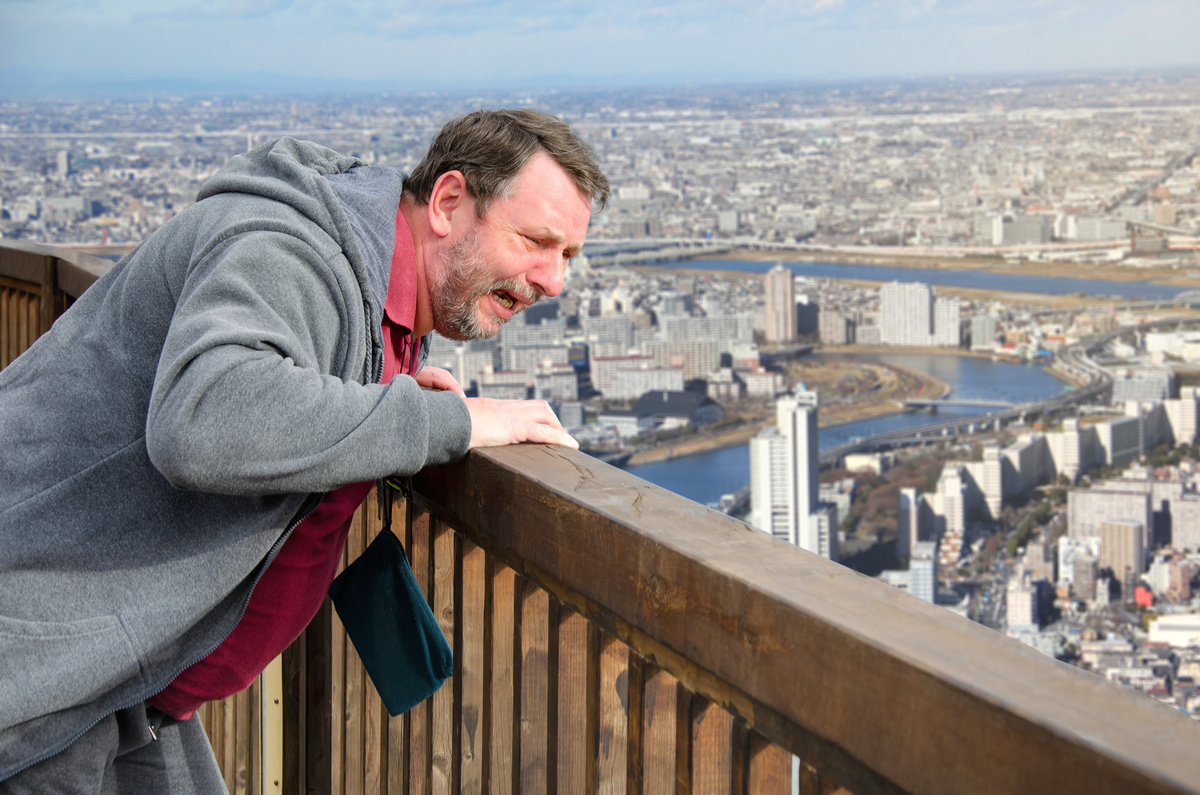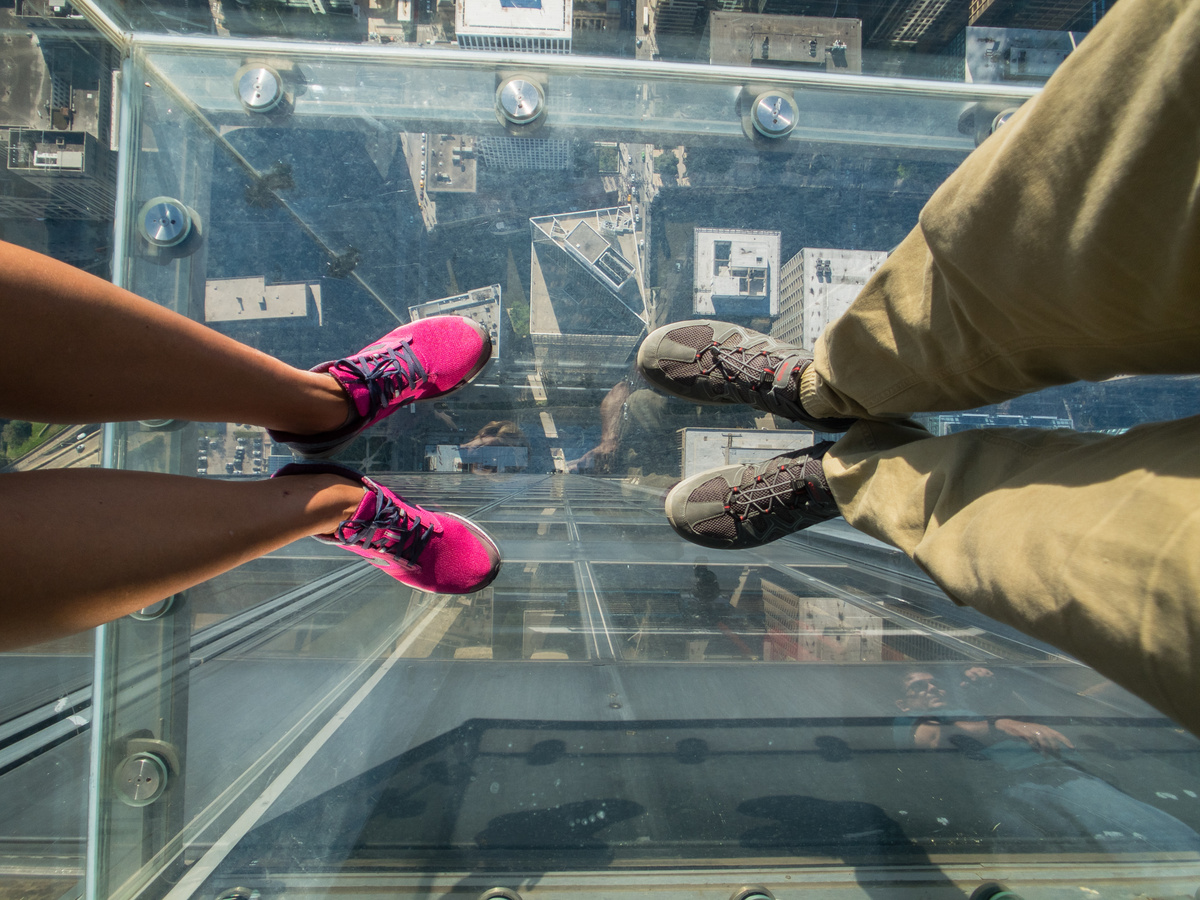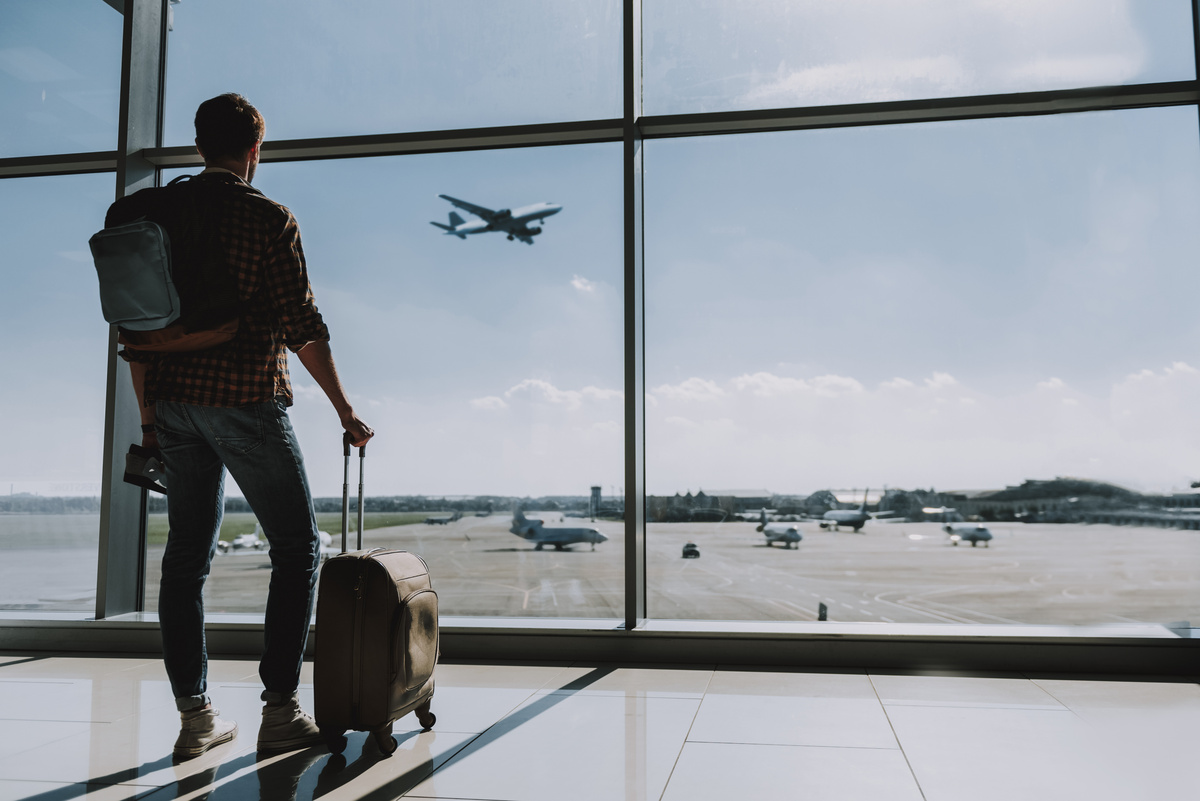Table of contents
General considerations about fear of heights

Being afraid of some situations is common and protects us from dangerous events or actions. However, some phobias can hinder the life of the individual and prevent him from performing some activities. This is the case of fear of heights.
The fear of heights is understandable, since being in high places can represent risks for us humans. However, nowadays, there are several activities we do that require us to be exposed to a certain height, such as climbing elevators, being in high floors of buildings and flying in airplanes.
Therefore, understanding the fear of heights, where it comes from, what its symptoms are and how to face it is important. If you suffer from this phobia, keep reading and find out everything!
Fear of heights, its consequences and ways to cope

The irrational and exaggerated fear of heights is known as acrophobia. It is believed that 2 to 5% of people in the world suffer from this type of phobia and, in relation to men, women are the most likely to have acrophobia. Understand the consequences and ways to deal with this fear in the following reading!
Fear of heights, acrophobia
Among the various phobias that exist in the world, acrophobia is one of the most common, being also evaluated as a form of anxiety disorder. This is a fear that deserves attention and should not, under any circumstances, be delegitimized.
This is because excessive fear of heights can often lead to panic attacks and even prevent people from having a healthy social life. The relationship between height phobia and panic attacks can generate a disability and cause an agitation capable of endangering the life of those who suffer from this disorder.
The consequences of suffering from fear of heights
The origin of the name acrophobia comes from the combination of two Greek names, "Acro", which means high, and "phobia", which means fear. High heights can cause vertigo in anyone, but the exacerbated fear that arises in those who see themselves in this situation can awaken extreme reactions.
Acrophobics can react in ways that are detrimental to their lives, compromising both the emotional aspects and their quality of life. This even leads them to have some triggers that trigger panic attacks, even in safe places.
Those who suffer from this phobia when being in places with great height may experience the following symptoms:
- Vertigo;
- Excessive sweating;
- Cardiac arrhythmia;
- Sweating;
- Headache;
- State of lethargy;
Therefore, understanding this phobia that has the potential to damage your life could generate a number of positive consequences in the social and professional spheres.
Understand your fear
The person conditioned to feel an irrational fear of circumstances that put them at higher heights presents some risks. In those moments, they can trigger symptoms such as dizziness, headache and even a panic attack.
This fear of heights needs to be investigated, as it can be linked to traumatic experiences lived in the past by the individual. In these cases, therapy will help to re-signify these memories. Therefore, it will be necessary to seek a therapist to understand your fear, to present you with treatment options and start this process of re-signification.
When facing the fear of heights, keep rationality
From the moment we are conditioned to some kind of phobia, such as fear of heights, for example, emotions are the main reason that leads us to lose total control of the situation.
During these moments of height dread, what occurs is an emotional kidnapping that takes away the control of our thoughts. You should then try to breathe deeply to relieve the tension and be able to work your rational side, so that you can identify whether the situation offers danger or not to you.
When facing a fear of heights, stay calm
This is not an easy task, but for those who want to face the fear of heights, it is essential that you learn to stay calm. For this, it will be necessary to control your breathing, because it is from it that you will be able to decrease the intensity of the symptoms generated by acrophobia and prevent a panic attack.
This way, breathing will allow you to keep control of your thoughts and deal with the situation rationally. As a result, you will notice that your heart rate will reduce and you will have a better chance of staying calm.
Respect your body's limits and take your time
No phobia can be solved overnight, because you need to respect your time and work on your treatment day by day. Imposing any kind of rush may hinder your progress and frustrate your expectations.
So, start with simple coping exercises, such as looking out the window of a higher floor, or even watching videos or pictures of places with higher heights that you want to know. Observe how your body reacts and focus on your breathing. Soon, you will be able to feel your evolution and will perform activities in these places without fear.
The main causes of fear of heights

Acrophobia has been attributed to conditioning or trauma that triggers a fear of heights. In fact, theories about the causes of fear of heights need to be investigated, so that you understand what relationships gave rise to your own phobia.
Discover the main causes that make people develop a picture of acrophobia in the following!
Emotional motives
Psychologists state that acrophobia may be related to a human need to develop a higher degree of self-confidence in order to overcome their limits. By denying or depriving themselves of their individual freedom, the individual may be feeding feelings that awaken the fear of heights.
Moreover, acrophobia can be originated in its essence by traumas of psychological and emotional aspects, which are hidden in our unconscious. In turn, these problems will only be perceived with some kind of therapy or treatment, such as hypnosis.
Exposure to high and unprotected places
The exposure to high and unprotected places awakens in people who have acrophobia a constant feeling of insecurity. This occurs due to the fear of imminent fall, generating a false sense of imbalance and causing physical and emotional disorders, capable of leading the person to have a panic attack.
Past traumas
In general, phobias usually appear by the end of second childhood, early adolescence, and tend to worsen with advancing age. Fear of heights can be caused by traumatic events or by some external influence, such as when a parent shows dread for certain stressful experiences.
These events generate memories in our brain that are associated with negative feelings, such as anguish, fear and danger, putting people in a state of alert when present in similar situations. These experiences are reawakened and, to the extent that they are not treated, they become traumas.
Thus, the causes can be multiple, as they go according to the individual's experience. Therefore, they require treatment accompanied by professional guidance, either a psychologist or a therapist. It is important to remember that the sooner these phobias are treated, the faster and more efficient your disorder will be solved.
Symptoms generated by fear of heights

Apprehension and nervousness accompany acrophobics on a daily basis. From climbing a simple ladder to taking a flight, they generate negative experiences capable of affecting the human being physically and psychically. Read on and understand the symptoms generated by fear of heights to know how to deal with your trauma effectively!
Agitation and muscle tension
The fear of heights can become disabling in several ways. By generating a state of tension in individuals, they will feel a restlessness and even muscle tension capable of causing tremors.
This reaction is a result of the common mammalian feeling of fear. However, depending on their degree and how they affect your body, they can trigger a response from your nervous system capable of generating a state of lethargy. This could put the individual at risk, depending on the situation.
Anxiety
The worry of an imminent fall in situations where the person is involved with high heights, such as flying in an airplane, generates an adrenaline rush in individuals suffering from acrophobia.
This leads them to anticipate accidents and imagine their falls, making this situation a trigger for anxiety. Soon, people stop thinking rationally and start developing an irrational fear, living in a state of imminent danger.
Panic
Panic is one of the last states caused by fear. Naturally, when we face situations in which we feel in a state of alertness, danger or even death, we produce physical and psychic stimuli that can lead us to an emotional hijacking. This triggers the panic attack.
In the case of fear of height, acrophobia, its main trigger is high places that tend to awaken traumas experienced in childhood. Soon, the individual becomes a victim of worry, anxiety and especially fear.
Loss of control
Loss of control is one of the most critical symptoms of acrophobia, because its cognitive aspect often becomes difficult to reverse. This symptom makes the individual unable to think and act, preventing any initiative taking on his part.
Headaches
The acrophobic, when seeing himself in a risky situation caused by the fear of heights, has a sudden increase in his pulse rate. Soon, the blood bombarded to his body intensifies, pressuring the vessels and generating the headaches so characteristic of this phobia.
Tachycardia
Tachycardia is one of the first symptoms to appear when people with height phobia are exposed to high places. Usually, it is caused by the increase in blood pressure, besides a lack of control in breathing, which leads them to develop a cardiac arrhythmia.
Treatments for fear and height

The phobias are disorders that, if left untreated, can generate a series of problems, from social withdrawal to the risk of one's own life. Of course, there are people who are able to live life normally without treatment, but nothing prevents their traumas from evolving.
So, if you are aware of your acrophobia, avoid worsening your disorder by following the treatments for fear of heights in the reading below!
Psychotherapy
There are several therapeutic approaches capable of helping you with your disorder, and one of them is psychotherapy. It is worth remembering that it has several modalities, and the ideal choice for you will depend on the psychic aspects, symptoms and your clinical history. The numerous possibilities only ensure that there is a solution.
Generally, psychologists seek to apply techniques and methods in order to treat the traumas experienced in their childhood. The solution to the problems will come from the re-signification of their past experiences, modifying their behavior and their perception of themselves.
Treatment of acrophobia by exposure
The treatment of acrophobia by exposure will require the person to have direct contact with their fear in a very similar way to a shock treatment. It is usually applied in phases, being divided by levels of progress from the easiest to the most difficult.
Using as an example, we have the steps of a ladder. As the person goes up the ladder, at each step, the intensity of the fear felt should be observed up to the level of emotional and psychological control of the patient. Thus, he will be aware of his limit and how to deal with the symptoms.
Each level experienced by the intimate contact with his phobia should be evaluated and coordinated by a health professional. In this way, the patient will not be exposed to challenges that put his physical and psychological integrity at risk.
Implosive or flood therapy
Inclusive or flood therapy consists of placing the patient exposed in front of his fear, giving no possibilities for him to avoid it or escape. Thus, he will have to deal directly with his trauma in an attempt to control his symptoms.
This technique presents great results, since the desensitization process occurs in such a way that the patient realizes that his phobia is irrational in nature. However, the result of this treatment will only be effective if accepted by the patient himself.
Hypnotherapy
Hypnotherapy is a therapeutic modality known for using hypnosis techniques on its patients and is able to activate the first memories that triggered the trauma of fear of heights.
In this way, you will be able to better understand the origin of your problem, to know how to respond more efficiently in relation to your disorder. With each hypnosis session, you will relive these memories and also be placed in a confrontational position.
Therefore, the entire treatment is based on a direct confrontation of the trauma, in an attempt to overcome it, in order to improve their well-being in relation to the disorder.
Medicines
The irrational fear of heights often leads us to limiting thoughts that can be an obstacle in our daily lives. This occurs due to the worsening of symptoms, awakening panic attack crises and even generating social isolation, affecting the social and professional sphere of these individuals.
Upon reaching this clinical picture, the use of medication will be necessary for the patient to gradually regain his psychic strength, preventing the worsening of symptoms and enabling his return to social life.
However, it is important to remember that the use of controlled medications will only serve as a palliative, and professional monitoring is necessary for the treatment to be more effective.
Are fear of heights and fear of flying related?

Acrophobia is more common than it seems; being part of a basic survival instinct of mammals, it often manifests itself in childhood. However, the way we perceive these stimuli and how they will be treated by the individual will serve as an indication of their evolution.
Nothing prevents a person from developing several types of phobias during their life. If their clinical condition worsens, the fear of heights can lead to a fear of flying, known as aerophobia.
But everything will depend on the experiences that originated the traumas and the way we react to them. It is worth noting that the psychic and physical signs that cause fear of heights are very similar to the fear of flying. Therefore, the association between these phobias can even be quite natural.

